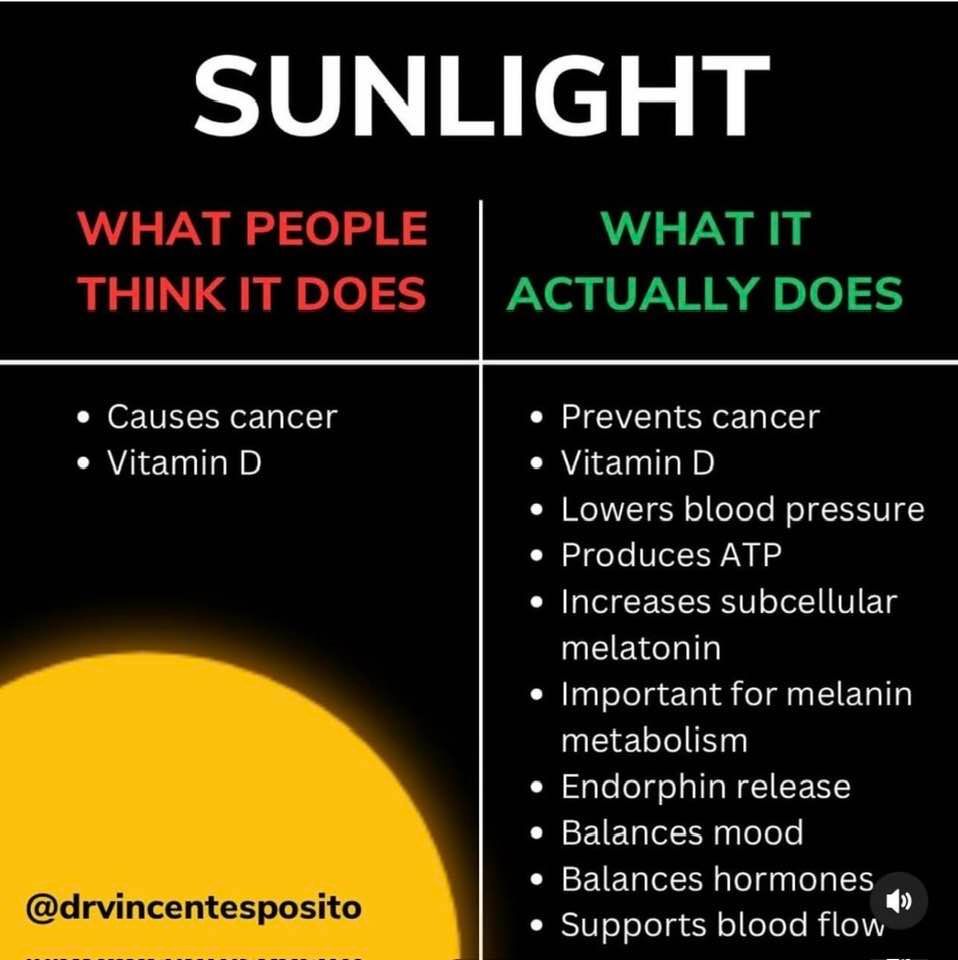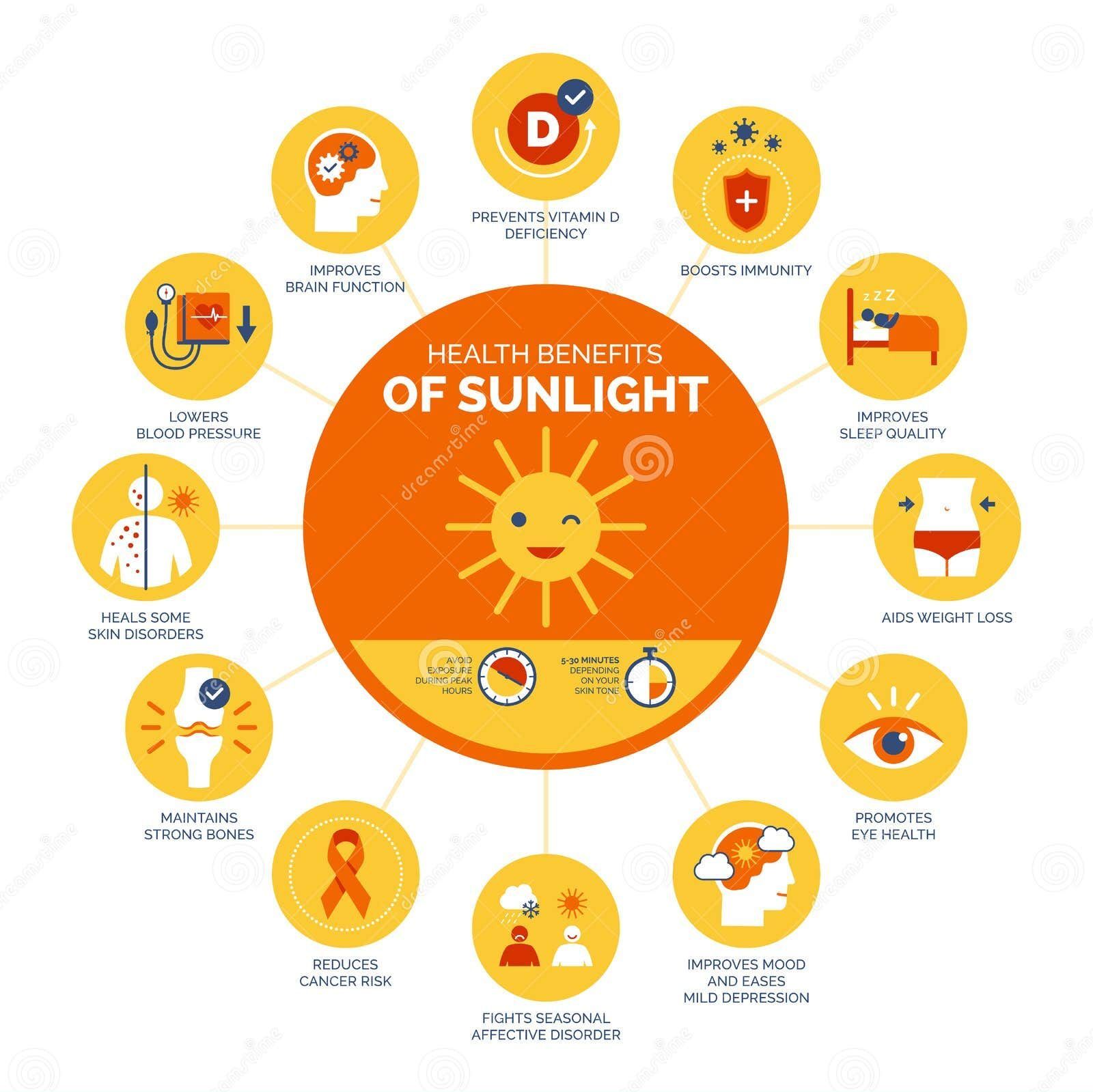As an Amazon Affiliate, I earn a commission on qualified purchases made through links used on my website. There are no additional costs to you.
The Top Benefits of Daily Sun Exposure on Your Mental and Physical Health
Nature is our best doctor

Do you get enough sun exposure?
Daily sun exposure is an easy way to reach optimal health.
The benefits are numerous.
From Vitamin D production, to mood elevation and immune function there are so many reason why you should expose your skin to the sun.
We've all heard the term “winter blues” and part of the reason so many people are affected by it is due to not enough exposure to that life-producing ball of gas across the galaxy.
During the winter months in the northern hemisphere, the sun is further away from Earth so the UV exposure is weakened.
Combine that with the colder temperatures that force us to cover up more of our skin and we get a one-two combination of reasons why we get less results from the sun.
During the winter, the answer is to try to get longer exposure to the sun when possible.
As for daily exposure, depending on skin type and location, most people will only need 10-20 minutes of sunlight exposure.
Bare skin with the face, arms, and legs exposed. Keep the sunglasses inside so that the photoreceptors in your eyes can help set your circadian rhythm.
(especially helpful to get outside at sunrise for this)
Most days, while I'm eating my first meal, I'll go outside with Odin and we will sit on the outdoor furniture together so I can eat while getting my sunlight exposure.
It's a great time to slow down and appreciate nature and just enjoy the sights and sounds while sitting next to one of my best friends.
Being at peace is also boosting your health by elevating your mood while practicing gratitude.
I encourage you to find ways to take moments in your day to create healthy habits for your physical and mental well-being.

Let's take a further look into the benefits of sun exposure:
1- Vitamin D Production:
- Bone Health: Vitamin D is crucial for calcium absorption, which is essential for maintaining healthy bones and teeth.
- Immune Function: Adequate levels of vitamin D support a healthy immune system, helping to fend off illnesses.
- Mood Regulation: Vitamin D deficiency has been linked to mood disorders, such as depression, so adequate sun exposure can help improve mood and reduce the risk of depression.
2- Mental Health Benefits:
- Enhanced Mood: Exposure to sunlight increases the production of serotonin, a neurotransmitter that can boost mood and promote feelings of well-being and happiness.
- Seasonal Affective Disorder (SAD): Regular sunlight exposure can help alleviate symptoms of SAD, a type of depression that occurs at certain times of the year, usually in the winter.
3- Skin Health:
- Psoriasis and Eczema: Controlled exposure to sunlight can help alleviate symptoms of skin conditions like psoriasis and eczema.
- Healing Properties: Sunlight has natural antiseptic properties and can aid in the healing of wounds and cuts.
4- Circadian Rhythm Regulation:
- Sleep Patterns: Sunlight helps regulate the body's circadian rhythms, improving sleep quality and duration. Exposure to natural light during the day can help you sleep better at night.
5- Cardiovascular Health:
- Blood Pressure: Sun exposure has been shown to help lower blood pressure by triggering the release of nitric oxide, which helps dilate blood vessels.
6- Metabolism and Weight Management:
- Metabolic Health: Sunlight exposure can influence metabolic functions and help with weight management by improving insulin sensitivity and aiding in the regulation of body fat.
7- Anti-inflammatory Effects:
- Reduced Inflammation: Sunlight has been shown to have anti-inflammatory effects, which can benefit individuals with inflammatory conditions like arthritis.
8- Enhanced Immune System:
- Immune Boost: Regular, moderate sun exposure can enhance the immune system's ability to fight off infections.

9- Eye Health benefits include:
Regulation of Circadian Rhythms:
- Melatonin Production: Exposure to natural light, especially in the morning, helps regulate the production of melatonin, a hormone that controls sleep-wake cycles. This can improve overall sleep quality, which is essential for maintaining healthy eyes.
Myopia (Nearsightedness) Prevention:
- Outdoor Activity: Studies have shown that spending more time outdoors during childhood and adolescence can reduce the risk of developing myopia. Natural sunlight exposure helps in the normal development of the eyes and can slow the progression of nearsightedness.
Production of Dopamine in the Retina:
- Eye Growth Regulation: Sunlight stimulates the production of dopamine in the retina, which plays a role in regulating eye growth. Proper dopamine levels can help prevent abnormal eye elongation that leads to myopia.
Enhanced Vision:
- Contrast Sensitivity: Natural light exposure can improve contrast sensitivity, allowing the eyes to distinguish between different shades and patterns more effectively. This can enhance overall visual performance and clarity.
Vitamin D Synthesis:
- Eye Health: Vitamin D, produced in the skin through sunlight exposure, has anti-inflammatory properties and supports overall eye health. Adequate vitamin D levels can help prevent various eye conditions, including age-related macular degeneration (AMD) and dry eye syndrome.
Mood and Eye Health Connection:
- Reduced Risk of Depression: Improved mood and reduced risk of depression from sunlight exposure can indirectly benefit eye health, as individuals with better mental health are more likely to engage in activities that promote overall well-being, including eye care.
This should be enough to encourage you to spend more time outdoors.
Enjoy life and nature. For your health!
"Raise your frequency"
-Metahuman Dave
Coach

